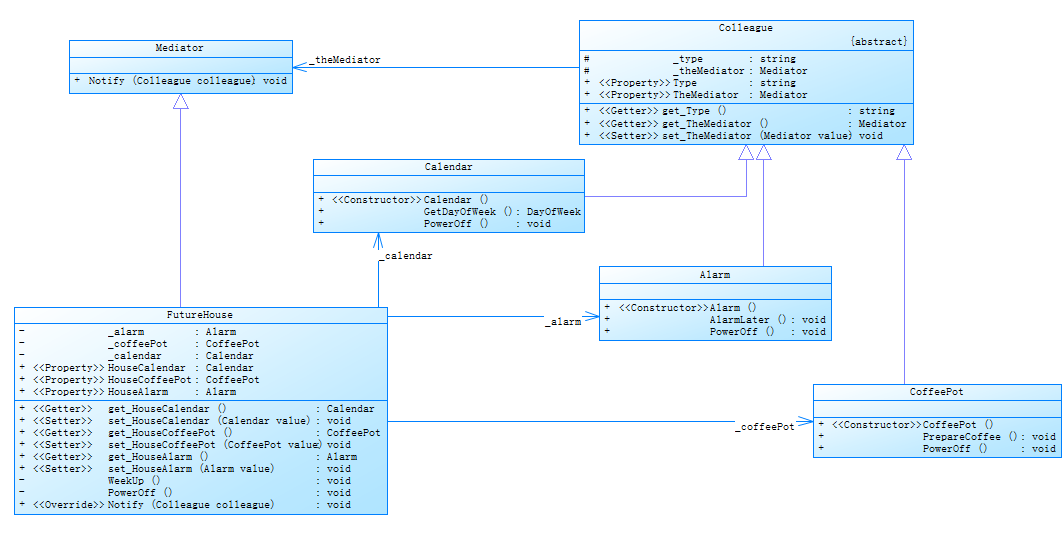意图
用一个中介对象来封装一系列的对象交互。中介者使各对象不需要显示地相互引用,从而使其耦合松散,而且可以独立地改变他们之间的交互。
适用性
- 一组对象以定义良好但是复杂的方式进行通信。产生的相互依赖关系结构混乱且难以理解。
- 一个对象引用其他很多对象并且之间
- 想定制一个分布在多个类中的行为,而又不想生成太多子类。
结构

实现
在未来的智能家居中,家里的各种电器相互关联,假设这样三种电器:闹钟,日历和咖啡壶。现在有这样两个任务:
- 当按下闹钟的“延迟”按钮(过5分钟后再次响铃)后,日历检查今天是否是星期日,如果不是,则咖啡壶开始准备咖啡。
- 当关闭日历,咖啡壶和闹钟也一同关闭。
同事类,每一个同事都知道他的中介者,当它需要与其他同事交流时,它只需通知中介者。
public abstract class Colleague
{
protected string _type;
protected Mediator _theMediator;
public string Type
{
get { return _type; }
}
public Mediator TheMediator
{
get { return _theMediator; }
set { _theMediator = value; }
}
}
具体同事
public class Alarm : Colleague
{
public Alarm()
{
_type = "Alarm";
}
public void AlarmLater()
{
Console.WriteLine("Alarm 5min later");
_theMediator.Notify(this);
}
public void PowerOff()
{
Console.WriteLine("Alarm PowerOff");
}
}
public class CoffeePot : Colleague
{
public CoffeePot()
{
_type = "CoffeePot";
}
public void PrepareCoffee()
{
Console.WriteLine("Start preparing coffee");
}
public void PowerOff()
{
Console.WriteLine("CoffeePot PowerOff");
}
}
public class Calendar : Colleague
{
public Calendar()
{
_type = "Calendar";
}
public DayOfWeek GetDayOfWeek()
{
return DateTime.Today.DayOfWeek;
}
public void PowerOff()
{
Console.WriteLine("Calendar PowerOff");
_theMediator.Notify(this);
}
}
中介者定义一个用于与各同事通信的接口
public class Mediator
{
public virtual void Notify(Colleague colleague)
{
}
}
具体中介者了解和维护各个同事,并协调各同事以实现协作行为。
public class FutureHouse : Mediator
{
private Alarm _alarm;
private CoffeePot _coffeePot;
private Calendar _calendar;
public Calendar HouseCalendar
{
get { return _calendar; }
set { _calendar = value; }
}
public CoffeePot HouseCoffeePot
{
get { return _coffeePot; }
set { _coffeePot = value; }
}
public Alarm HouseAlarm
{
get { return _alarm; }
set { _alarm = value; }
}
private void WeekUp()
{
if (HouseCalendar.GetDayOfWeek()!=DayOfWeek.Sunday)
{
HouseCoffeePot.PrepareCoffee();
}
}
private void PowerOff()
{
HouseCoffeePot.PowerOff();
HouseAlarm.PowerOff();
}
public override void Notify(Colleague colleague)
{
if (colleague.Type == "Alarm")
{
WeekUp();
}
else if (colleague.Type == "Calendar")
{
PowerOff();
}
}
}
使用
class Program
{
static void Main(string[] args)
{
var calendar = new Calendar();
var coffeePot = new CoffeePot();
var alarm = new Alarm();
var house = new FutureHouse();
calendar.TheMediator = house;
alarm.TheMediator = house;
coffeePot.TheMediator = house;
house.HouseCalendar = calendar;
house.HouseAlarm = alarm;
house.HouseCoffeePot = coffeePot;
alarm.AlarmLater();
calendar.PowerOff();
Console.ReadKey();
}
}
运行结果
- 周日

- 非周日

效果
- 减少了子类
- 将各Colleague解耦
- 简化了对象协议,使用Mediator和各Colleague间的一对多交互替代多对多交互
- 它对对象如何进行协助进行了抽象
- 使控制集中化
- 中介者可能变得庞大而且复杂,难以维护